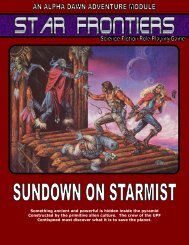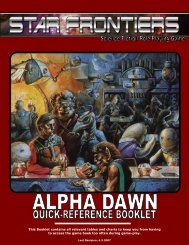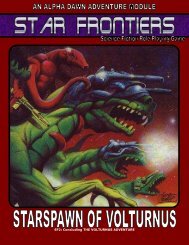Alpha Dawn - Star Frontiersman
Alpha Dawn - Star Frontiersman
Alpha Dawn - Star Frontiersman
Create successful ePaper yourself
Turn your PDF publications into a flip-book with our unique Google optimized e-Paper software.
14<br />
170<br />
Skill Level Damage Bonus<br />
Level 1 no bonus<br />
Level 2 +1d10<br />
Level 3 +1d10<br />
Level 4 +2d10<br />
Level 5 +2d10<br />
Level 6 +3d10<br />
Experience<br />
Points<br />
The main rules book explains the guidelines for<br />
distribution of experience points (X.P.), but it’s quite<br />
vague. This article attempts to organize it into a<br />
simple process.<br />
The Old Way<br />
Each session you earn 1-3 experience points depending<br />
on whether or not a goal was reached and how well it<br />
was overcome. To the average, a character should<br />
receive between 3 and 7 experience points. No more<br />
than 10 experience points per gaming session. But<br />
what constitutes a “goal” and how many should there<br />
be?<br />
The New Way<br />
At the end of a game session, the referee goes through<br />
the following checklist with each player. One<br />
experience point is awarded for each of these that<br />
apply.<br />
This will result in receiving 3-7 experience points per<br />
session, with no more than 10 being awarded, just as<br />
in the original way.<br />
1. Survival – All characters will earn this one. Your<br />
character will receive one X.P. just for surviving the<br />
session. Even if he learned nothing, and did<br />
nothing. Just being around greatness can rub off.<br />
2. Ability – if you made an ability check during the<br />
session, you will be awarded one X.P. This is to<br />
represent physical and mental development. Of<br />
course, you don’t have to spend that X.P. on that<br />
ability.<br />
3. Skill – You get an additional X.P. if you made a<br />
skill check at some point during the session. It<br />
doesn’t matter if that skill check resulted in success<br />
or failure. Testing your knowledge and training will<br />
result in excellence.<br />
4. Discovery – Characters earn one X.P. if the player<br />
can say one previously unknown thing that his<br />
character learned about the frontier or its people.<br />
Players can be creative here, but the purpose of<br />
this award is twofold: first, it allows a character to<br />
grow based on knowledge as well as practice.<br />
Second, it helps a player summarize in his mind<br />
something about the game setting, helping him to<br />
gain a better picture of it in his mind.<br />
5. Role-playing – You get one X.P. if you role-played<br />
your character well. This is determined by the<br />
referee. The more solid your character concept<br />
and background story, the more likely you’ll get<br />
this award. This award shouldn’t be given out<br />
lightly; rather, it should be given if a character<br />
loses out on something or takes on additional<br />
complexities just to stay in character, when<br />
violating a character concept would have been<br />
easier and more beneficial.<br />
6. Innovation – If you faced non-combat obstacles<br />
(such as security devices, pits, puzzles, etc.) that<br />
required you to take a direct role in overcoming,<br />
you’ll get an additional X.P. This shouldn’t be given<br />
freely just because some obstacle existed; it should<br />
be given to reward characters for coming up with<br />
an innovative solution to an obstacle.<br />
7. Notoriety – legends are made by people telling<br />
tales, not by the deeds themselves. People tend to<br />
try to live up to the tales told about them, and it is<br />
sometimes the carrot that leads a donkey to<br />
greatness. If your character saved innocent<br />
people, overcame obstacles in a manner that<br />
onlookers will remember, or allowed enemies to<br />
live on to spread the tales of his toughness, your<br />
character will be awarded one X.P. It doesn’t<br />
matter if the notoriety you gain is in the form of<br />
fame or infamy (all press is good press?)<br />
8. Personal – if your character had a personal stake<br />
in the adventure (it centered around family<br />
members, friends, contacts, etc.) then he or she<br />
will gain an extra X.P. This shouldn’t be given out<br />
freely; this award is to represent those rare<br />
adventure sessions where players find themselves<br />
extremely wrapped up in the story because of how<br />
it directly affects the development of his or her<br />
character’s concept.<br />
9. Victory – Any character who engaged in combat of<br />
any type against enemy creatures, robots, or<br />
people and lived to tell the tale are awarded 1 X.P.<br />
The Frontier is a dangerous place, so this is one<br />
category the player can almost count on!<br />
10. Success – If this session had a main mission or<br />
story goal (determined by the referee) and you<br />
were successful, you receive one X.P. Success of a<br />
mission isn’t any more heavily weighted as using<br />
your skills or abilities or surviving the session.
















